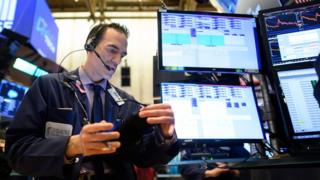
- Global stock markets have sunk despite central banks around the world announcing a co-ordinated effort to ease the effects of the coronavirus.
Global stock markets have sunk despite central banks around the world announcing a co-ordinated effort to ease the effects of the coronavirus.
US markets plunged more than 7%, triggering an automatic suspension of trade in the minute after opening.
London’s FTSE 100 index has fallen more than 8%, and other major European markets have seen similar falls.
On Sunday, the US Federal Reserve cut interest rates to almost zero and launched a $700bn stimulus programme.
It was part of co-ordinated action announced alongside the eurozone, the UK, Japan, Canada, and Switzerland.
However, investors are worried that central banks now have few options left to combat the impact of the pandemic.
The new governor of the Bank of England, Andrew Bailey, has pledged to take fresh “prompt action again” when necessary to stop the damage to the economy from the coronavirus pandemic.
David Madden, a market analyst at CMC Markets, said that while central bankers were trying to calm the markets, “in reality it is having the opposite effect”.
“The radical measures have sent out a very worrying message to dealers, and that is why they are blindly dumping stocks.”
In London, firms in the travel sector saw big falls. Holiday firm Tui sank more than 27% after it said it would suspend the “majority” of its operations. BA-owner IAG fell more than 25% after it said it would cut its flight capacity by at least 75% in April and May.
The FTSE 250, which includes a number of well-known UK-focused companies, was trading down by more than 12%.
All the main European share indexes fell sharply, with France’s Cac 40 index down more than 8% and Germany’s Dax dropping 7%.
Earlier in Asia, Japan’s benchmark Nikkei 225 closed down 2.5% and the Shanghai Composite in China ended the day 3.3% lower.
On Sunday, the US central bank, the Federal Reserve, cut its interest rates by 100 basis points to a target range of 0% to 0.25% and said it would offer at least $700bn for support to the markets in the coming weeks.
Speaking after the announcement, Fed chairman Jerome Powell said: “The virus is having a profound effect.”
But stock markets dived as investors worried that the world’s biggest central banks may now have very little ammunition left to deal with the effects of the coronavirus if the global economic climate continues to worsen.
“They [the Fed] pulled out whatever weapons they had and my sense is I think it may help initially but I don’t think it goes much further because this is still a developing issue. They used up basically all their ammunition and we’re down to sticks and stones,” said Robert Pavlik, chief investment strategist at Slatestone Wealth.
Why should I care if stock markets fall?
Many people’s initial reaction to “the markets” is that they are not directly affected, because they do not invest money.
Yet there are millions of people with a pension – either private or through work – who will see their savings (in what is known as a defined contribution pension) invested by pension schemes. The value of their savings pot is influenced by the performance of these investments.
So big rises or falls can affect your pension, but the advice is to remember that pension savings, like any investments, are usually a long-term bet.
Alongside the Fed, five other central banks – the Bank of England, the European Central Bank, the Bank of Japan, the Bank of Canada, and the Swiss National Bank – also announced measures to make it easier to provide dollars to their financial institutions facing stress in credit markets.
The move was designed to bring down the price banks and companies pay for US dollars, which has surged in recent weeks.
Andrew Sentance – a former member of the Bank of England’s Monetary Policy Committee, which sets interest rates – told the BBC’s Today programme that banks were acting to ensure enough credit was flowing.
“There was some criticism around the financial crisis that central banks didn’t move quickly enough,” he said. “I see this as a partly precautionary action for central banks to show that they are doing as much as possible to keep the wheels of the economy turning.”
Mr Sentance added that any further cut to the base rate in the UK, to 0.10% for example, would be “symbolic, because it wouldn’t have that much impact on companies or individuals”.
In other developments on Monday:
- Oil prices fell again, with Brent crude sinking 11% to $30.13 a barrel
- The Bank of Japan eased monetary policy by pledging to buy risky assets at double the current pace and announced a new loan programme to extend one-year, zero-rate loans to financial institutions
- Shares in Australia recorded their biggest daily percentage fall on record, as the benchmark ASX 200 index dropped 9.7%
- The Reserve Bank of Australia said it “stands ready” to pump more money into the country’s financial system
- New Zealand’s central bank lowered interest rates by 75 basis points as it prepared for a “significant” hit to the economy.



